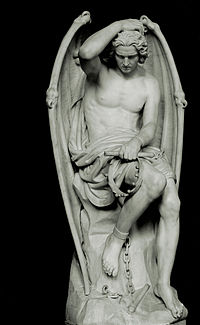 |
| Lucifer (Le genie du mal) |
There are some bad answers to this question and some terrible answers to this question. It would be hard to explain who Satan is without putting one’s personal spin on it. The only way I believe one can answer it honestly is as the question, ‘Who is Satan to me?”
As a devout atheist, I’m not overly interested in Satan as a theological concept, as the antithesis of God or as an active force for evil in the world today. I’m interested in Satan as a character from one of the greatest works of world literature: the Bible. When I think of Satan, I think of the many-faceted character from Biblical Christianity who is, in my view, more complex and more intriguing than the Satan of Judaism or the Shaytan of Islam. I am also happier dealing with the Christian Satan as being raised in a notionally Christian country and being occasionally packed off to Sunday School as a child (so mum and dad could have Sunday morning to themselves) I feel a certain ownership of Christianity and therefore have the right to comment on it, mock it and write collaborative comedy pieces about it.
The Satan of the Christian Bible is the tempter of Christ in the wilderness, the serpent in the garden of Eden, God’s fellow gambler in Job and the great dragon thrown down by the Archangel Michael in Revelations. He is given various names including the devil, Satan (the adversary), old serpent, Beelzebub, the great dragon and Belial. A perfectly reasonable view would be to say that these differently named characters were indeed written as completely different and unrelated individuals. However, I (like the Christian fathers) like the idea of trying to stitch these different elements together and squeeze them into one individual, an act not unlike the index card character creation game we played in the pub.
In fact, just like that game, the early Christians accepted some writings as authentic and worthy of inclusion in the Bible and rejected others as unhelpful, needlessly similar to others or just plain wrong. The Satan of ‘The Lives of Adam and Eve’ is one of the non-canonical texts which is a fascinating exploration of the devil’s motives and one I would happily include in my own personal bio of Satan.
So, who is Satan to me? He is:
· God’s one-time right hand man
· The angel who opposed the creation of people (with free will and all the trouble that would cause)
· A rebel who lost the war in heaven and was thrown down
· The serpent who suggested that Eve should eat the fruit from the Tree of the Knowledge of Good and Evil so that she could become “like God.”
· The court-room advocate who argued that Job only loved God because God was kind to him.
· The ‘Prince of this World’ who tempted Jesus to take an alternative path to that of messiah
In short, if all the world’s a stage and God’s the star turn then Satan is the heckler at the back of the room, second-guessing punchlines, pointing out the smoke and mirrors and writing a critical review that will never be published.
Yeah, I like Satan. Do remember, I’m an atheist. I’m not a Satanist. I like the character of Satan and all he represents to me. I’m conveniently choosing to ignore the Christian Satan who spreads lies and disease and corrupts hearts. I don’t like bad people but I do like people who ask questions and who are willing to stand up to dictators even when – especially when – that defiance is pretty darn futile. I always remind myself that Christianity itself teaches that Satan is more prisoner of hell than master of it.
Satan gets played in movies by Robert DeNiro and Peter Stormare and David Warner (whereas God only gets Morgan Freeman and Alanis Morrisette). Satan appears on far more heavy metal album covers than God. Satan is a rebel. He gets all the cool lines. He pokes fun at God and that makes him the ultimate satirist.
Why wouldn’t I want to write a sprawling piece of comic prose about him?
Photograph: Lucifer (Le génie du mal) by Guillaume Geefs (Cathedral of St. Paul, Liège, Belgium) – copyright – Luc Viator

